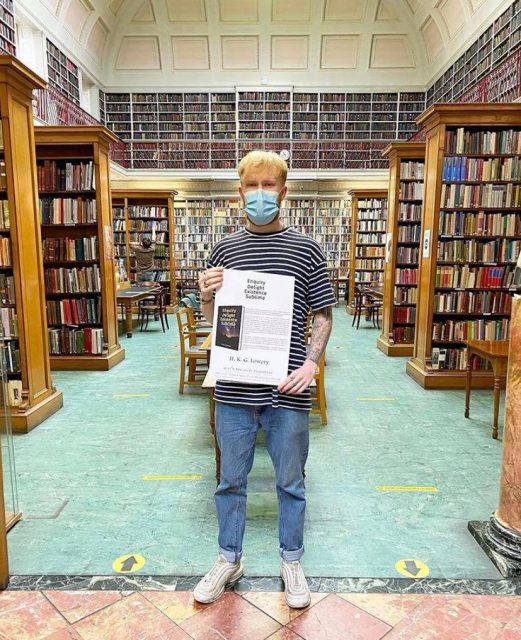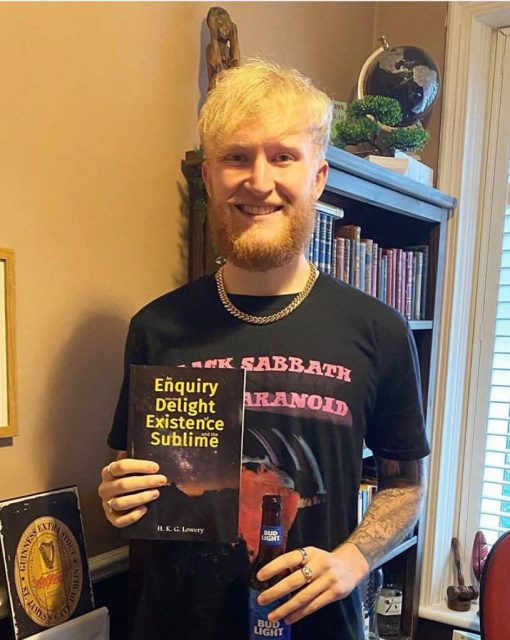
Poetry and Philosophy: An Interview With H. K. G. Lowery
The realities of life and the philosophies of our existence are a huge subject area, especially for a young, up-and-coming poet, but H. K. G. Lowery tackles it with acuity beyond his years in his inaugral work, which I was able to explore with him this week.
JOHN NICHOLS
NOVEMBER 14, 2020
H. K. G. Lowery is a poet based in the North East of England who recently published his first collection of work, An Enquiry into the Delight of Existence and the Sublime. We recently discussed his journey into poetry, his inspirations, and the philosophies of his work, which I have reproduced here. It’s an insightful look into a brilliant young mind, which I hope you find as captivating as I did.
John Nichols: Harry, if you don’t mind, let’s kick off with a question on who you are. You’re the antithesis of what many would consider the archetypal poet – you’re fresh out of university, in an alt-rock band, and write with a vision that plays in stark contrast to your youth. What drove you towards poetry at such a young age, and are there any links between your written and musical endeavours?
H. K. G. Lowery: While I could give a big autobiographical answer about my GCSE and A-Level lessons in English Literature that were always both intriguing and appealing, I’ll be concise and say it was mostly my time at university.
“I gravitated towards poetry like falling asleep: slowly, then all at once.”
I studied English Literature at Newcastle University because it was what I was academically best at, although I did feel rushed into this decision by the general education system. I enjoyed, to an extent, English Language and Geography in Sixth Form, but they never felt like the right paths, for whatever reason. I owe a lot to the university syllabus in that it really expanded my interest, knowledge and awareness of literature. I matriculated to Newcastle as an undergraduate only really knowing of (and certainly not reading outside of school) Shakespeare and Coleridge, and after a few modules at university, I began reading Homer, Ginsberg, Shelley, Eliot and others as though I had never read before.
To quote John Green, I guess I gravitated towards poetry like falling asleep: slowly, then all at once. As far as my musical endeavours go, it’s always great to write and contribute lyrics to our songs – I guess this idea exhibits how infinite and applicable language really is.
You mentioned feeling rushed into studying English Literature, rather than having a desire to study it outright. Did your lecturers lead you into finding your calling, to an extent? What key figures guided you into the poetry space, and what impact have they had on your development?
I would definitely say so. I often think if I could reset the time from leaving Sixth Form to now, the only thing I would change would be taking, perhaps, a gap year; but after everything I’ve learned and experienced, I would choose literature again, and every time.
Looking back, I took a particular liking to the Romantics earlier on at university, and so I would always choose the modules that included their work. I soon became obsessed by the biographies of these poets as, although the term Romanticism is retrospective, they all championed the same literary and philosophical manifesto. To an extent, I had already subscribed to this manifesto before reading or writing at the lengths I soon did.
“After everything… I would choose literature again, and every time.”
I could talk for hours about Romantic ideology, but the most sympathetic aspect of their vision to me is the importance of the Poet and Poetry. I was introduced to Shelley’s A Defence of Poetry at university, and this really developed my forming of opinions on the craft. Therefore, I would say I have Percy Shelley, Mary Shelley, Lord Byron, and Samuel Taylor Coleridge to thank as key figures who guided, and still guide, me through my journey in Poetry.
Compulsory modules on Classic Literature and the Renaissance were always enjoyable for me, but later on in my studies I became just as consumed by Modern and Postmodern Literature, and so I would add Allen Ginsberg, Ocean Vuong, and Danez Smith to my little list of guiding poetic figures.
Speaking of romanticism, you preface this collection of poetry as being a journey through life and existence, but ultimately, acceptance of the realities of humanity. Did your thoughts on these topics change throughout your work on this collection, and on a macro-level, what should the reader expect to come away from this collection with?
When composing the collection, I think the theme and role of ‘the journey’ was at first subconscious, but it quickly became a very conscious decision to work with the idea of a journey. There are many journeys in the collection – despair to delight, forgiveness, acceptance, realisation, faith – and although acceptance can be seen as a journey in and of itself, it is still very symbiotic and relative to the other examples of journeys.
In a way, I don’t think we can make many personal journeys, such as forgiveness, without accepting the realities of humanity and the predicament of what it is to be human.
Therefore, I think my only thought that changed, throughout the journey of composing and editing, was the realisation of seeing the possibilities of journeys, that we can rise after a difficult time, that we can discover wonderment or rediscover faith, and that the despairs of existence are compensated by the delights of existence; that is what I would like people to take away from this piece of work.

This being your inaugural published work, tackling the very nature of existence is a huge task, but you have approached it with such deep thought and consideration. What can we expect from you in the future? Are there any particular subject areas or philosophies you would like to explore?
Thank you, I really appreciate the kind words. On reflection, the topics and philosophies that my debut work tackles are quite grand – I suppose I was subconsciously paying homage to the greats before me, like Shelley who had composed and published Queen Mab before he was 21. If anything, I just had a burning desire to express my thoughts and philosophies at that stage of my life, so I’m very grateful and humbled to be able to write and share my ramblings with other people.
“Poetry is like an instrument, a sport.”
As for the future, having spent a lot of time indoors writing and editing this year, I have written a few more collections, one of which, I hope, will be published in Easter 2021. For this project, my second collection, I wanted to tone the poems down in terms of content (i.e. shifting a poem directly about God to a poem about snooker or going to the pub) but equally I wanted to keep the grander ideas, only embedding them more subtly in my work.
Poetry is like an instrument, a sport. You find yourself in a state of constant learning where your literary career becomes the perpetual effort of your existence to perfect your craft as best you can. I believe my first work is naïve in many ways and could be improved (I am forever and always my own worst critic) but it remains a pivotal emblem that I can always look back on as that stage of my life, my early writing, and to remember my roots, as it were.
With that in mind, my second collection, I believe (and hope!), is an improvement due to the composition, the content, the form, the ideas… things I won’t go into further detail about and will leave for the reader to find out for themselves.
Sounds fascinating – I’m eager to experience your next endeavours! To the ones reading this blog, with your first collection in mind, what would you like to say to them? What message do you have for the person on the other side of the screen? Do you have any thoughts, ideas or advice for them to consider?
I would like to thank the reader for their interest. Poetry is a very personal and private thing for both the poet and the reader, and so it is truly great for both parties to share their love for the craft and to find all the pleasures of poetry that are there to be found.
“By reading poetry, you can be enlightened, humoured and relieved, among so many other emotions and feelings.”
I also think poetry has a strange role and position in this world. It is very undervalued. Oftentimes, poetry is the only way to chronicle and explain the elements of humanity and/or world events – you could say when the world is in turmoil, poets are at their best. Therefore, my thoughts would be to let poetry into your life (as I personally believe it is the best medium to translate feelings and philosophy) but also to support the community of poetry.
Anyone in the arts, whether they are musicians, actors, or writers, mostly depend on their followers in order to enable them to work at their best (for, say, financial freedom and their platform). Poetry, particularly, is an inexpensive hobby and you receive so much more than the words on the page. By reading poetry, you can be enlightened, humoured and relieved, among so many other emotions and feelings. You can also learn a lot, and poetry can help you with so many life experiences: heartache, death, love, forgiveness – you name it.
Therefore, the best advice I could give to people as a poet would be to read poetry. Poetry is everything.
Thanks Harry, wise words to end on – it’s been a joy!
I thoroughly enjoyed answering the questions and I’m extremely grateful for your interest. Thanks again.
H. K. G. Lowery’s inaugral poetry collection, An Enquiry into the Delight of Existence and the Sublime, is available at Waterstones for £7.99.

Published November 14, 2020.